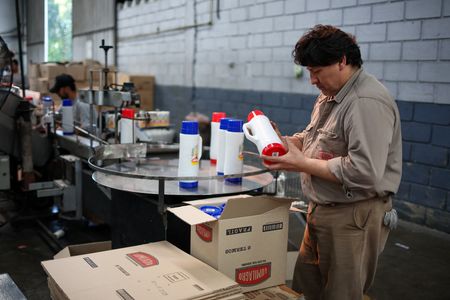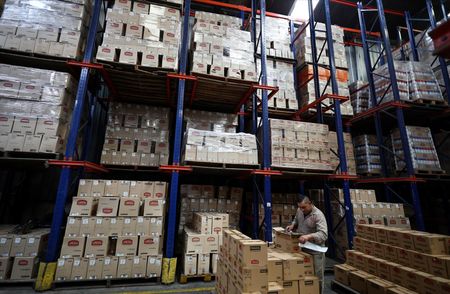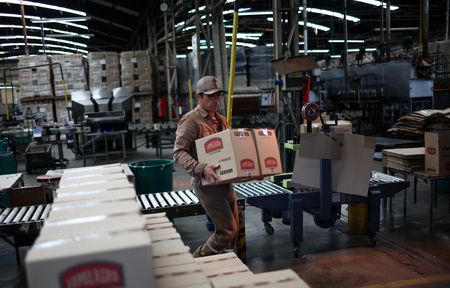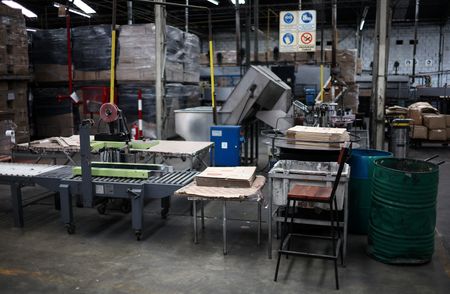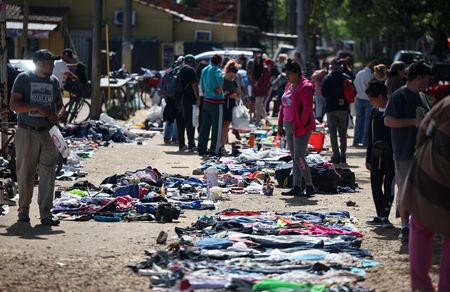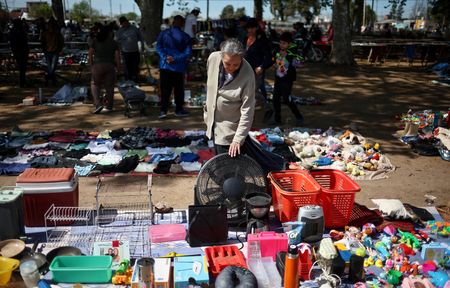By Nicolás Misculin
BUENOS AIRES (Reuters) -For decades, Lumilagro rode to prosperity on the popularity of its signature steel or glass thermoses Argentines use to carry hot water to make mate, the locally ubiquitous herbal tea.
But now, faced with cheaper imports, rising production costs, and declining sales, the over 80-year-old family business has been forced to scale back, its commercial manager Carlos Bender told Reuters. He said it now imports most of the thermoses it offers, at prices up to 30% lower than the cost of producing locally.
The company, whose website proudly declares "Made in Argentina," shut down its glass furnace 18 months ago, operates only one of its four assembly lines and has cut its workforce from 160 to 60, Bender said in an office adjacent to its half-empty warehouses, calling the process "very painful."
The Lumilagro case is emblematic of a broader challenge facing Argentina under a radical economic overhaul by President Javier Milei, who U.S. President Donald Trump has called his "favorite president."
Milei's drastic spending cuts have succeeded in achieving a fiscal surplus, no small feat for a country that has long run steep deficits, and in sharply reducing inflation.
But manufacturing has suffered as deregulation has spurred growing competition from cheaper imports that have also benefited from a peso widely viewed as overvalued, as well as reduced consumer purchasing power.
In August alone, industrial production fell 4.4% year-over-year. Unemployment in the factory-heavy suburbs of Buenos Aires spiked to 9.8% in the second quarter from 9.1% a year ago, according to the Indec statistics agency.
That is hammering support for Milei's coalition - which already suffered a crushing defeat in Buenos Aires provincial elections in September - ahead of this month's crucial midterm elections.
Milei's libertarian party and its allies need to increase their presence in the opposition-dominated Congress to advance the president's agenda of free-market reforms and sustain his vetoes of congressional spending bills, which have lately been frequently overturned.
After taking office, Milei relied on an inflated local currency, public spending cuts and high interest rates to reduce annual inflation that hovered around 200%. But those policies, especially the overvalued peso, helped trigger an increase in imports, economists say.
Milei's government declined to comment. It has said that its policies will put Argentina on a more stable footing and allow it to develop an economy based on energy, mining, agriculture and AI.
HURTING MANUFACTURERS
Similar dynamics have forced ceramics company Ilva to close its factory in the Buenos Aires suburb of Pilar, leaving 300 of its former workers camped out in front demanding some form of indemnization.
"We didn't expect this, what they're doing to us today, leaving us out in the cold, helpless, and without our wages," said Juan González, one of those laid off, laying the blame for the business' problems squarely on Milei's government.
"Ever since this government came in, sales dropped," he said. "The company gradually declined because, as sales were low, we produced less."
Ilva did not respond to a request for comment.
The economic panorama still has some bright spots, most of them in a burgeoning mining and energy sector, such as the Vaca Muerta shale formation - although there are signs of weakness there as well.
Milei's approval ratings slumped to a new low of 39% in September, according to a survey by the University of San Andrés. Polling experts cite weariness with austerity measures, corruption scandals involving his sister, and a perception that Milei's combative and flamboyant persona has started to grate.
"People blame Milei for the fact that the macroeconomic stability that he's achieved doesn't help on the microeconomic level," said Marina Acosta, director of consulting firm Analogías.
Acosta said that Milei could still benefit, however, from a continued reluctance from voters to support the opposition Peronist party that dominated Argentine politics from the 1940s.
On October 26, Argentines will elect 127 deputies — half of the chamber — and 24 senators, one-third of the total.
US GIVES ECONOMIC LIFELINE
Milei appeared alongside Trump at a meeting at the White House on Tuesday. The U.S. Treasury agreed to provide a $20 billion currency swap line for Argentina this month, offering an economic lifeline to prop up the peso.
Washington's continued support was conditional on Milei retaining power and keeping the Peronists out, Trump said. "If he loses we are not going to be generous with Argentina," he added.
Either way, U.S. aid is unlikely to improve — at least in the short term — the situation facing local manufacturers.
The owner of an automotive parts factory in Buenos Aires, speaking on condition of anonymity, said sales had fallen since Milei took over and that in response it had maintained imports but cut manufacturing in half.
The parts his company imports from China cost up to 75% less than those manufactured locally, he added.
Luis Campos, an employment analyst for the CTA Autónoma trade union, acknowledged that Milei's policies had produced some stability but that in terms of jobs, "this economic model has already given all it had to offer."
"The problem with the winning sectors of the current economic model — large-scale agribusiness, energy, and mining... is that they are not labor-intensive activities," he said.
(Reporting by Nicolás Misculin; additional reporting by Miguel Lo BiancoEdited by Lucila Sigal, Christian Plumb and Rosalba O'Brien)


